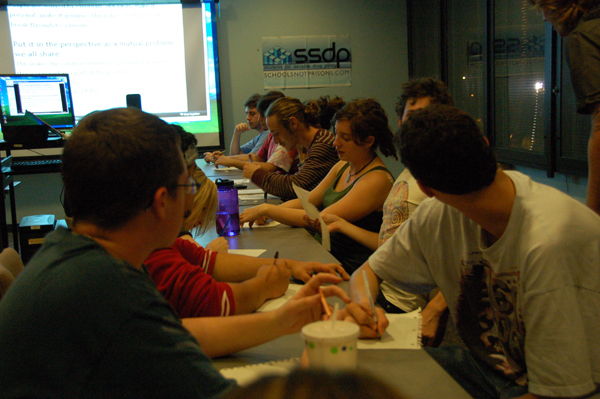

A student activist club is getting the conversation started on campus about drugs and an alternative drug policy.
The Students for Sensible Drug Policy (SSDP) chapter at New Paltz have launched a new program called Harm Reduction Center (HRC).
“On this campus, it’s just to provide scientifically based, unbiased information to the students about drugs and alcohol,” said Maria Scarangella, an HRC coordinator. “About the things that we are aware [of], and we admit kids get into. To just spell out in terms that they can understand, and tell them the things that are relevant to them.”
Harm reduction began nationally in the late ‘80s to promote safer habits with drug use, according to New Paltz’s SSDP Facebook page. The information reads that volunteers in the program understood that drug use wouldn’t end completely, so they taught users how to inject properly, they also provided clean needles and condoms.
Scarangella said HRC at New Paltz was planned initally last fall, but was stalled due to personal obligations and infrequent SSDP club membership. This year, the group hopes to be the middle ground on the drug debate, where they can keep students informed and safe.
“Where as the [school] administration might say ‘don’t do drugs, there’s no time or place for drugs’ we’re saying ‘here’s the information, we know you’re going to do it, so here’s information on how you can do it safely,’ said Sen.Wendy Cohen, an administrator of the group.
Cohen believes students can make their own decisions. She said she wants students to review external information, but it doesn’t necessarily have to come from the forces in their life, such as parents or friends. The information HRC dispenses will be supported by science but applied to specific scenarios, according to Cohen.
Things will get personal, but that’s the point. The group hopes people will call if there is an overdose. That person needs to know who to call if they need help in determining the effects of a certain drug.
However, ensuring the safety of students with drug-related issues is also a top priority of SSDP and HRC. The group said they want to share with students and the community the real-deal behind drug use. They said anyone can go online and read about a drug, but on these websites, it doesn’t say how it feels, or what happens if you take it with something else.
“If something’s going wrong, they need to be able to know what to do, not to be afraid to take action,” said Brendan Mitchell, an administrator of the group. “We just want people to make the right decisions.”
But first people have to get involved.
The group said once HRC and SSDP start “picking up steam”, they want to incorporate more kids who don’t go to the meetings. To increase their currently “small radius.” Mitchel said people from all walks of life, and not just the “party people”, deal with issues of drug use.
Although no one is currently involved on the administrative level, Scarangella said she wants to bring professors into the mix. She said they would be useful on informing students on some of the same topics HRC looks to cover. One event the group hopes to host this year is an interdisciplinary panel of professors to speak about drug topics, professors from various departments including anthropology, Latin American studies and Black Studies. Cohen said she wanted to include someone who works with pharmaceutical-type drugs.
However, Cohen said she doesn’t see other administrative officials partaking in HRC. She said they aren’t going to have a say in what research and information they use. She added that the administration doesn’t come down to check off on what they are saying.
“The point of it is ‘by the students, for the students’ type thing,” said Scarangella.
With student participation, the group hopes to attract people by cosponsoring events with The Black Student Union, The Latin American Student Union and by word-of-mouth campaigns. The group believes this year is the “tipping point.” Cohen said in the United States, 16 states have enacted medical marijuana policies, with three being created just this year. On a local level, New York passed a 911 Good Samaritan Policy that went into effect this past weekend, according to EmpireStateNews.Net.
The website continues: “This new life-saving policy gives legal amnesty to individuals in need of medical treatment resulting from drug or alcohol use, as well as individuals who seek help for someone else in need of medical assistance resulting from drug or alcohol use.”
The group said they draw inspiration from the German and Portuguese models of harm reduction. Turning away from incarceration, and more towards a system where psychological and family services are available. Scarangella said incarceration doesn’t discourage drug use and that the road to sobriety is a rough journey, but one that includes positivity.
“The whole model of harm reduction is meeting you where you’re at,” said Scarangella.
The interdisciplinary panel of professors is scheduled for sometime in November. For more information, the HRC office is 330 in Student Union (SU), or visit their Facebook page http://www.facebook.com/groups/216747521678068/.
